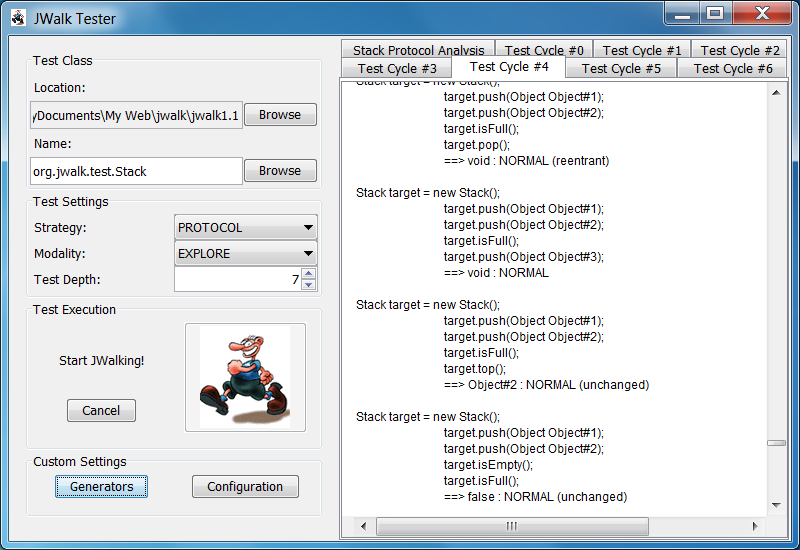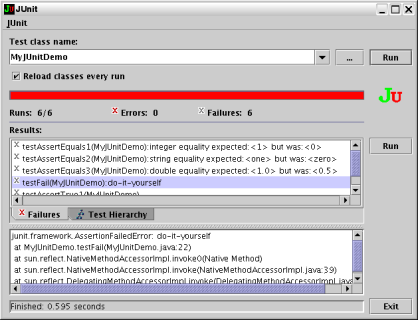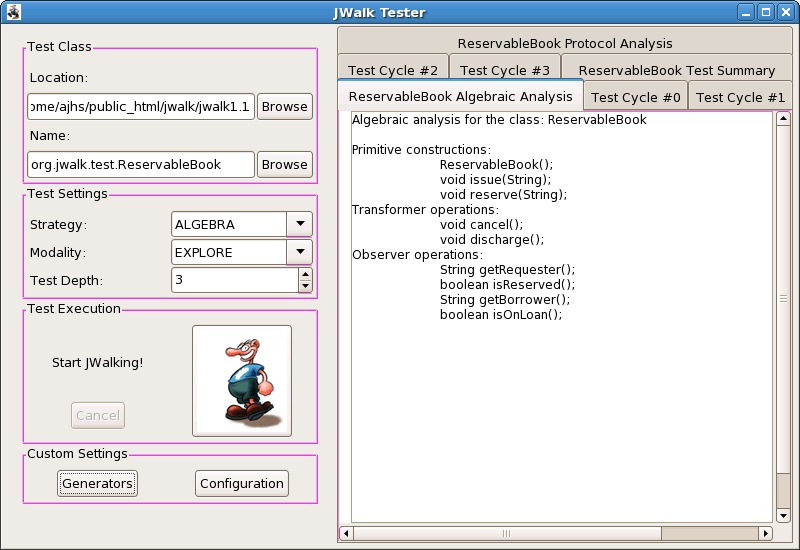
|

|
JWalk software testing tool suiteLazy systematic unit testing for agile methods |

|
The JWalk Home Page
Start JWalking Here...JWalk is a tool suite for lazy, systematic unit testing. The featured JWalkTester tool performs bounded exhaustive testing of any compiled Java class, supplied by the programmer. It tests for full conformance to a lazy specification, which is inferred on-the-fly from the code, by static and dynamic analysis, and from hints supplied by the programmer. Lazy systematic unit testing is based on the two notions of lazy specification, in which the intended specification of a class stabilizes gradually as the design for the class evolves, and systematic testing, in which the whole state-space of the object is exhaustively tested for conformance to the specification. The testing method is aimed at the agile methods community, for whom the production code and saved tests are the only enduring artifacts. No formal specification need be produced up-front. The advantage of JWalking over other testing methods is that the tools can automatically infer the test cases that the programmer needs to supply, in order to ensure full state and transition coverage of the inferred specification. The tools construct and present these test cases automatically, saving the programmer time and effort. The JWalking MethodThe JWalk tools can be used right from the outset, as soon as a prototype class has been compiled. The programmer follows a feedback-directed approach, first "exploring" the behaviour of the prototype, generating reports of its behaviour for manual inspection. If the observed behaviour diverges from what was expected, changes can be made to the code. Later, the programmer "validates" the test class, directing the tools to learn the intended specification incrementally, by a combination of dynamic analysis and limited user-interaction. As the programmer confirms or rejects key test outcomes, the quality of the learned test oracle improves, eventually allowing tools to predict the results of over 90% of new test cases. With a fully trained oracle, testing is completely automated, testing exhaustively up to the inferred specification. Depending on the test strategy selected, the tools can explore all method protocols (all interleaved combinations), all algebraic constructions (all sequences that put the test object into new states) or all high-level states and transitions (where the states are inferred automatically from information given in the test class's interface). Testing can be carried out to an arbitrary depth chosen by the programmer. Finally, if the source code is later modified, the tools can re-learn just the parts of the specification that were changed. So, JWalking is ideally suited to agile methods, where the code base is expected to change frequently. 
JWalk versus JUnitThe software unit testing tool most familiar to the agile community is JUnit, which allows testers to run hand-crafted regression tests repeatedly on production classes. In a straight comparison with test authoring by an expert JUnit tester, the JWalk tools were able to test up to two orders of magnitude more cases for the same invested time and effort! This is because JWalk makes better use of test automation:
JWalk tools take the effort of thinking up the right test cases away from the tester, by proposing the cases that even the expert fails to discover. When the test class is modified or extended by subclassing, JWalk generates exactly those new test cases that are required for all novel interleaved combinations of local and inherited methods. This is much more discriminating than regression testing using saved JUnit test suites. Eventually, fully trained test oracles are capable of detecting every mutation made to the code of the test class. JWalk provides the full power of specification-based conformance testing for programmers who don't want to write formal specifications! 
JWalk Tool SuiteWe are pleased to announce the availability of the JWalk 1.1 tool suite, which includes two finished tools and a component kit for creating your own JWalk applications. Built using run-anywhere Java, the tools configure themselves to the host's operating system, whether Windows, Unix, Linux or Mac (see the featured JWalkTester running on Linux with Gnome, oppposite, and on Windows 7, above). The user experience has been improved since the last public release of the the JWalk 1.0 tool kit, by multi-threading the application. The GUI no longer waits for the test engine to complete, but offers instant access to early test results. The animation now indicates how hard the engine is working, and the user may choose to cancel a job in progress. The core JWalker test engine has been upgraded to support being executed in the background, as a worker thread. The test generation, test pruning and test prediction algorithms are still as powerful as in the earlier release. Likewise, the test customisation interface supports uploading the same simple, black-box CustomGenerator test input generators. Two finished tools are currently supplied with the download bundle. JWalkTester is the flagship tool, a GUI-based Java class unit tester. JWalkUtility is the original command-line utility printing results to standard output. Further tools are in preparation, including a complete rebuild of JWalkEditor, an integrated Java editing, compiling and testing environment; and JWalkMarker, an instructor's tool that supports the automatic grading of student coding assignments. |